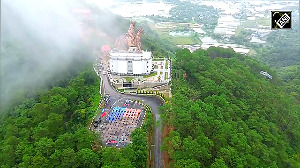The recently-developed 'Silicon Locket' by Indian Institute of Technology Bombay is a wearable electrocardiogram monitoring system.
It has been modelled on its more expensive imported counterparts such as the wearable 'Health Monitor' - a portable device that you wear to record a continuous ECG.
IIT Mumbai has around eight such pieces, which have been developed, under the supervision of Rakesh Lal at IIT Bombay, at one fourth the price of their imported counterparts (which cost nearly Rs 100,000).
The locket can record, store and download ECG signals of patients onto a personal computer, transmit it to a central server and then alert a doctor via SMS (mobile) about a patient's abnormal heart condition.
IIT Bombay is also working on a Rs 50 crore (Rs 500 million) project to improve the quality of water in our cities and villages. The project involves a network of sensors, which send signals to a central server that monitors the water quality.
What's common to both these projects is what we technically called "sensors". Nanotechnology has become a key technology in sensor development.
The small size of these sensors leads to reduced weight, low power requirements and greater sensitivity. V Ramgopal Rao, professor, Department of Electrical Engineering, IIT Bombay, said: "We would ideally like to price it at Rs 3,000. The volumes need to be around 100,000 for this kind of pricing. However, the industry has to pick up the cue."
Rao has touched the core of the issue that faces nanotechnology - one cannot take a short-term view. Experts concur with his outlook.
"While the industry is excited about developments in the field of nanotechnology, it's not investing enough money in the start-up stages that is very important for the growth of nanotechnology," says Tim Harper, CEO, Cientifica - a leading source of global business intelligence on nanotechnologies.
The problem lies with the distinction between nanoscience and nanotechnology. After $18 bn of government spending, nanoscience is finally becoming nanotechnology, says Harper.
He adds that "it's time for the industry to now take a look at the nanotechnology applications. The understanding of markets, applications and technologies is crucial for successful commercialisation of nanotechnology".
The worldwide government spend on nanotechnology is expected to increase by 15-20 per cent this year. However, "the government spending tells us little", opines Harper.
He advocates spending by the private sector, especially in the fields of Nano healthcare (led by the US and France) and nanomedicine.
However, does India have the infrastructure to take advantage of nanotechnology? "It's a broad yes with a caveat. Big corporations need to step in," says Srinivas Kilambi, president, Reliance Bio-Refinery.
G U Kulkarni, member of Nanomaterial Group, JNCASR, Bangalore, concurs with this view. "MNCs and big Indian companies approach the academia more out of curiosity rather than any expectation," he says. The biggest problem, according to him, is that policy markets talk to companies and the academia but do not have any follow-ups.
Peter Hatto, Director of Research, Ion Bond, notes that the "opportunity for India was to look at local solutions".
India needs to look at nanotechnology to tackle issues like wanting pure, dependable and continuous water supply (since it has tremendous impact on the healthcare system).
Global business may grow to $1 trillion in the next 10 years, according to Ashok Misra, director, IIT Bombay. The largest growth expected to be in materials at about $340 billion followed by electronics at $300 billion.
The others are pharmaceuticals ($180 billion), chemical manufacturing ($100 billion) and aerospace at $70 billion. He concludes that "the future of nanotechnology is bright".
Do you want to discuss stock tips? Do you know a hot one? Join the Stock Market Investments Discussion Group







